Text

Shop , Patreon , Books and Cards , Mailing List
5K notes
·
View notes
Photo
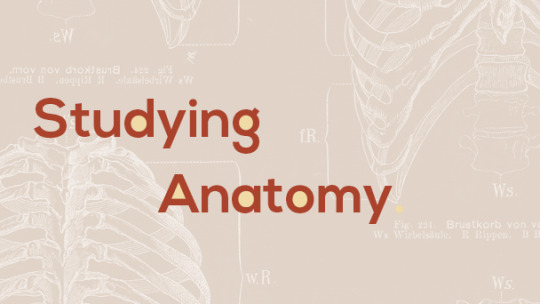
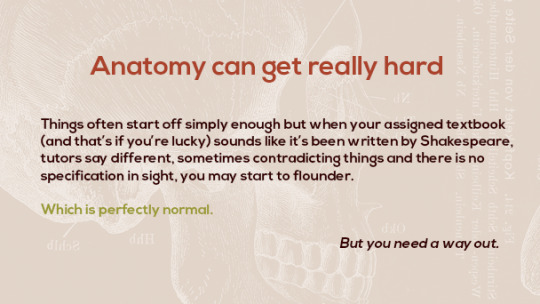

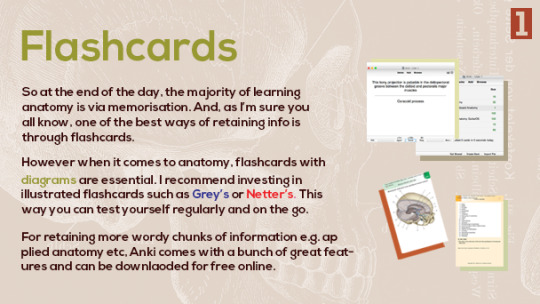
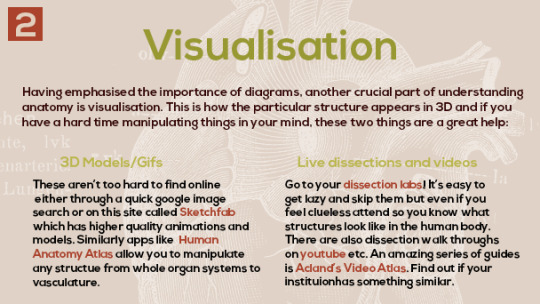
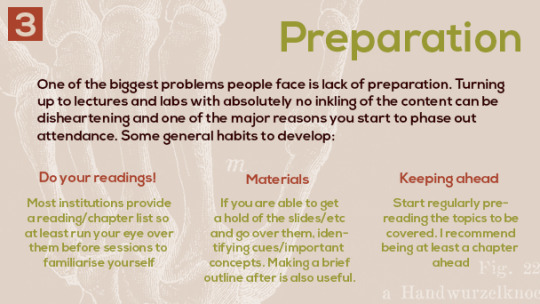




Here are some Anatomy tips for all of you working in/towards hands-on healthcare. I hope they’re useful x
3K notes
·
View notes
Photo

A new “How To Study” series!! Part 1 of ???
see part 2: How To Study Physics
How to study BIOCHEMISTRY (from yours truly, a biochem major at ucla)
(but also note that i’ve only taken one biochem specific class so far but this class was general biochemistry so hopefully the tips and tricks i learned from taking this class will apply to higher levels of biochemistry!)
studygram: @markiveelle
Biochemistry is a VERY dense subject, it requires a good background in general chemistry (such as acids and bases, thermodynamics) and a strong biology background (hence BIO cheMISTRY) (who would have ever guessed)
Anyways I like to think that biochem is not exactly a strenuous subject in that you won’t need to rack your brain to solve application problems, but it DOES require a LOT of memorization which is arguably less painful, but is still scary.
General Memorization Tips
Start early! The earlier you start your studying, the more time your brain has to process the information which means it will get more comfortable with it and you’ll probably be able to remember it more easily later.
BABY STEPS, don’t try to memorize like 600 terms in one sitting. You’ll probably get them mixed up. The brain doesn’t work that way (for most of us!). Instead, start with the first ten things, get them down really well, then move on to the next ten, then try to get all twenty together. And then the next ten, and then a cumulative self check, and so on. I think this was the best way to start. You have to find how much information you can retain in one sitting!
Make use of free time, try to recall things when you’re waiting in line for food, for the bus, for the shower to warm up, etc. Jogging your memory at all times helps make it more solid.
Make whatever you’re studying your phone/laptop background so it’s of easy access to you! I made the amino acids my iPad lockscreen when I was trying to memorize all of those!
Seriously flashcards help
Memorizing the 20 Amino Acids (and their structures…) in one week

My first quiz in my biochemistry class was to be able to remember all 20 amino acid names, three letter abbreviations, one letter abbreviations, and structures at physiological pH. It was scary lol I had to memorize all that in oNE WEEK (evil)
Grouping them into their respective types can help you in the long run when you may be asked which amino acids are present in polar/nonpolar environments.
I started memorizing the negative and positive amino acids first (there were the least of them lol). I used the cumulative batches method where I memorized the negative ones completely and then moved onto positive ones, and then did a cumulative self check. When I felt comfortable with those I moved onto nonpolar, then aromatic, then polar (idk why i did that order tho)
Most of the one letter abbreviations are the first letter of the name of the amino acid, especially in the nonpolar cases. I remembered the names and abbreviations of the nonpolar ones by just remembering GAVLIMP (read down the column!)
Glutamic Acid is GLU, E (which just spells glue)
Arginine is ARG ARRR ® like a pirate (lol)
Glutamine is Q and that’s weird so that resonated with me
Glutamine and Asparagine are similar to Glutamic Acid and Aspartic Acid in structure!
The nonpolar amino acid structures kind of build upon the previous one, which is also how I remembered those structures
I mainly took advantage of photographic memory in this case because whenever I was asked to recall a certain amino acid, in my head I would think about where that amino acid was on this poster I made. That helped my brain keep everything organized!
Memorizing Fatty Acids/Certain Carbohydrates
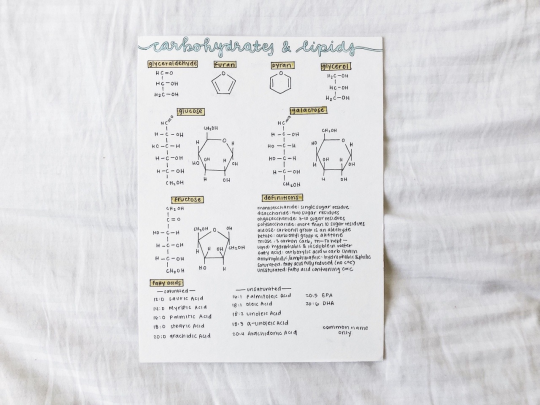
FLASH CARDS
Whenever you have to identify or name things, flashcards are the best!! I remember I made flashcards for everything on this page and me and my friends quizzed each other while waiting to be seated at korean bbq lol
Photographic memory again!! Write out all the stuff you gotta know onto one piece of paper (try to limit it to just one side) and study from that. It’s like organizing how your brain will remember stuff (kinda like you knowing exactly where something is in your drawer because you organized it that way)
Memorizing Pathways or Cycles
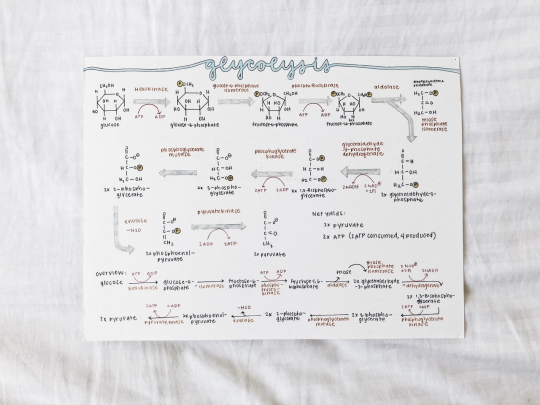
Glycolysis was the first pathway I had to remember, this one took me the longest because we were required to remember the structures, the names of the enzymes, the cofactors, LITERALLY EVERYTHING in one week it was a STRESS MESS
On this poster I have the detailed version that includes structures on the top and then a brief overview on the bottom that just has the names of stuff. I thought this helped (not sure how)
If you have taken organic chemistry in the past, then memorizing the structures may come a little easier to you because the names of the structures are super close to IUPAC naming so you can deduce from there!
It’s important to run through this IN ORDER over and over and over. Write it out so your hand gets a feel for it.
GOING IN ORDER IS JUST SO IMPORTANT because it conditions your brain to follow that order and you’ll notice that everything builds upon the other (the brain loves patterns and order so this will expedite memorization)
We also had to track carbons, so color coding would have helped in this case too! Color code each carbon so it’s clear where everything goes.
I think biochemistry is also a subject that requires a lot of time and effort, so make sure you give yourself time to study for it. Make a good study group as well so that you have many other people to correct you if you make mistakes, and you can correct them on their mistakes! I also think that catching errors or learning from previous errors is the BEST way to remember the RIGHT information because it shakes you; no one likes to be wrong!
But also remember that everyone has their own habits, find the study tricks that work best for YOU! The more you study, the more you discover what benefits you more. Keep an open mind and a good attitude towards the subject you are working on, and remember that so long as you try your HARDEST you’ll be proud of yourself in the end!!!
6K notes
·
View notes
Quote
“Life in the hospital is never the same from day to day, but one thing will never change – the patients will always be the greatest teachers. No textbook can ever teach you how to connect with patients or how to have hope even when you’re told it’s hopeless”
(via sweetmonster24md)
33 notes
·
View notes
Text
“Why do you want to be a doctor?” This is an answer of mine that stands out most notably.
5 years ago, almost to the date, I went to bed and my back hurt. Like. Hell. when I laid down. I figured it was just a muscle cramp or something, but it happened night after night. Painkillers didn’t work. I was getting less and less sleep. So I went to my pediatrician to get it checked out.
I know this is the point where many medical-student hopefuls will say that their doctor’s exceptional care inspired them to be a doctor. Not this time.
After saying “my back has been hurting every time I lay down or sit/stand for a long time,” the doctor asked “and are you suuuuuure it’s not because of your period?” I’m like, what part of “every day for the past 1.5 months” do you not understand? Sure, lower back pain may be due to cramps, but just because I possess a physiological function does not make that the sole cause of my problem.
I got it x-rayed, and referred to a bone doc. Spinal fracture. Go figure. I ended up in physical therapy, with a message from this second doc saying that if I felt pain shooting down my legs, I needed to go back in immediately, since that could signal potentially-paralyzing nerve damage. About a month later, I found myself making that dreaded call to the doc saying I had pain shooting down my legs. A third doc saw me this time to check my back again and get the ball rolling on a back brace. This doc asked me, after I described my symptoms, “are you suuure it’s not your period?” Like, yes I am absolutely sure that pain shooting down my legs possibly leading to paralysis is NOT a symptom of period-related cramps or pains!
Nevertheless, I averted paralysis and ended that summer back pain-free. And to this day, I still wonder how my life may have changed so drastically had I not had my mom in the room vouching for my pain so it wouldn’t be written off as “period cramps.”
I want to be a doctor because patients deserve better than this. Patients deserve a doctor who will make an accurate, appropriate assessment of their symptoms and work with them on a treatment plan. When somebody goes to a doctor - whether for a routine checkup, an illness, monitoring or treatment of a chronic condition, or an emergency - they deserve to be seen by a physician who listens to them before assuming anything, reading their body language and other clues for anything that might not get communicated verbally, and helps them obtain the best treatment for their circumstances and their lifestyle. I want to be that doctor for my patients. And I want to encourage other healthcare professionals to be that doctor, nurse, PA, etc. for their patients.
44 notes
·
View notes
Quote
“Wherever the art of medicine is loved, there is also a love of humanity.”
Hippocrates (via royalblackpirate-blog)
301 notes
·
View notes
Photo
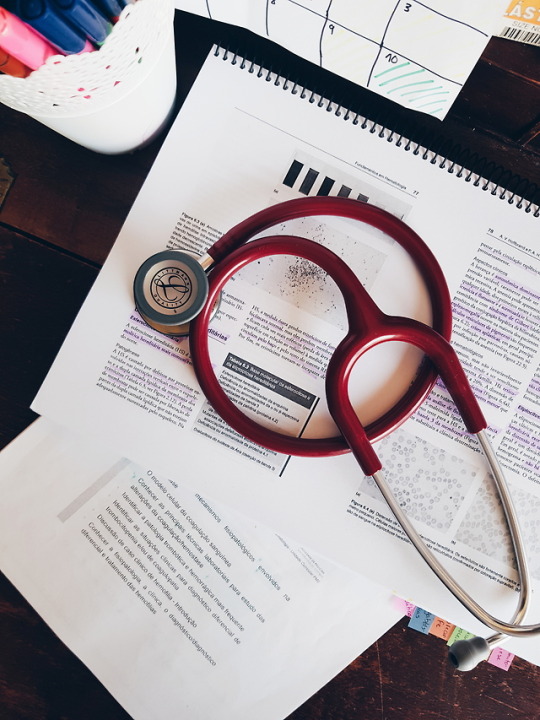
18/100 days of productivity — May, 14th, 2018
Hello everyone! I am back at university and getting ready for the end of the semester and exam period. I can’t say I am excited but I will give my best and study as hard as I can. This year has been very challenging but I’ve already seen results from my improvements which means I have to keep going. What about you? Are you already on finals period or getting ready for them? Good luck everyone! We can do this! 💪☘
studygram: medicinewithcoffee tag your 100 dop challenge with #mwc100dop to be featured in the blog!
529 notes
·
View notes
Photo

“Blood formation and circulation.” The Viavi gynecological plates. 1891.
Internet Archive
1K notes
·
View notes
Photo

Breath. Encyclopedia Brittanica Films. Introduction To Biology. 1952.
Internet Archive
1K notes
·
View notes
Text
Types of Epithelium


2K notes
·
View notes
Photo

The Skull of a Bone Cancer Victim.
Via Reddit: xkelsx1
2K notes
·
View notes
Photo

Neurons
Unipolar neuron: only one protoplasmic process (neurite) extends from the cell body
Bipolar neuron: neuron with two extensions (one axon and one dendrite)
Bipolar cells are specialized sensory neurons for the transmission of special senses
Sensory systems: smell, sight, taste, hearing and vestibular functions
Multipolar neuron: a single axon and many dendrites (and dendritic branches), allowing for the integration of a great deal of information from other neuron
Common in the central nervous system
Pyramidal neuron: type of multipolar neuron
Found in areas of the brain including the cerebral cortex, the hippocampus, and the amygdala
3K notes
·
View notes
Photo

The skull of a child before the eruption of the adult teeth.
Via Stefan Schäfer and Gizmodo.
4K notes
·
View notes
Photo

Brain Anatomy
Cerebellum - located at the back of the brain beneath the occipital lobes
Functions:
Fine tunes motor activity or movement
Assists in maintaining posture, sense of balance or equilibrium, by controlling the tone of muscles and the position of limbs
Important in one’s ability to perform rapid and repetitive actions
Frontal Lobe - largest of the four lobes
Functions:
Motor skills such as voluntary movement, speech, intellectual and behavioral functions
Plays an important part in memory, intelligence, concentration, temper and personality
Occipital Lobe - located at the back of the brain
Functions:
Enable humans to receive and process visual information
Influence how humans process colors and shapes
Temporal Lobe - located on each side of the brain at about ear level
Functions:
Involved in visual memory and helps humans recognize objects and peoples’ faces
Verbal memory and helps humans remember and understand language
Allows humans to interpret other people’s emotions and reactions.
Parietal Lobe -
Functions: positioned above the temporal lobe and behind the frontal lobe
interpret simultaneously, signals received from other areas of the brain such as vision, hearing, motor, sensory and memory
5K notes
·
View notes
Photo
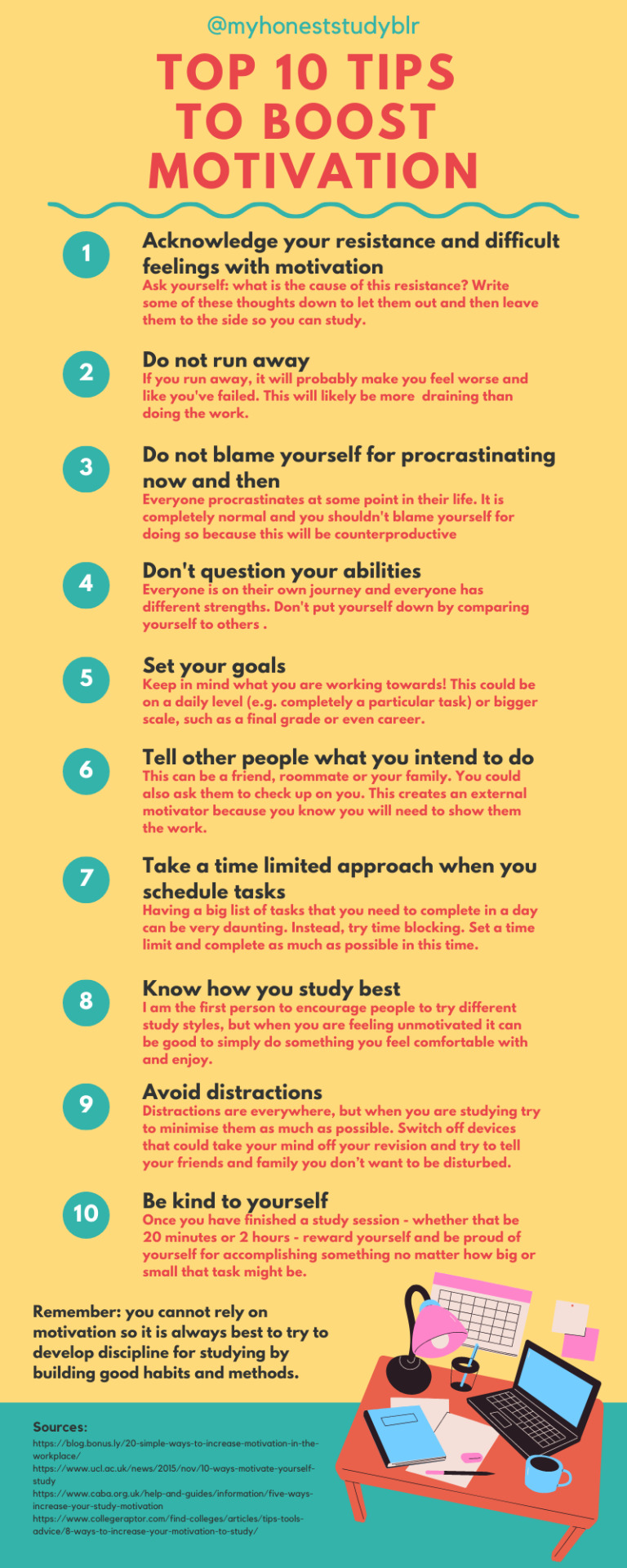
my masterpost | my studygram | ask me anything
[click images for high quality]
Other advice posts that may be of interest:
How To Stop Procrastinating
How To Study When You Really Don’t Want To
Unusual Study Tips
How To Do Uni Readings
Active Revision Tips
How to Focus in Online Classes
1K notes
·
View notes
Text
How to Take Notes from a Textbook
I’m currently facing the dilemma of how to take notes from a textbook. It’s hard to know where to begin or what’s the best information I need to really understand the material I’m reading. I have gathered tips and resources to better decide the best method to use the textbook most effectively.
-Preview. Glance over charts or photos used on the pages. Read study questions or summaries that might be given at the end of the chunk of pages. It preps me for the type of reading I will do and to think about the questions as I read.
-Read actively. Don’t take notes or highlight as you read. Read a short section before you stop to take notes and highlight. Your first step after you read the paragraph is to highlight a phrase or two that were the important parts that you’ll need to know for future reference. Also, go to the margins (or your post-its) and start writing a question or two for the paragraph. When you’re done with the entire section, go back and try to answer these questions without looking at the book. If you can answer it, you are doing well on recalling that paragraph. This is also a good time to make some notes for class.
-Review. At the end of the reading, write a summary (in your own words) of what you just read. It helps to understand what you retained from the reading and highlight parts you need to review. I also like to go back and try to answer those questions I made in the margin again. The BEST thing I like to do is to answer the comprehension at the end of the chapter. Each textbook has one. Answer those and, if you’re unsure of the answer, ask them during class!
Other tips:
-Try to keep your notes in your own words.
-If something is not making sense, try reading it out loud. That can often help you process the material in a new way.
-Multiply the number of pages you have to read by 5 minutes. That is the amount of time the average college student needs to spend on their reading assignment.
-Writing in the book itself is highly recommended, but if you have some reason for not doing that, you might also want post-its and use those on each page in place of writing in the book.
Resources:
Write Notes, Not Textbooks
How to Take Notes from a Textbook
Justine G. Feather- HOW I TAKE NOTES
6K notes
·
View notes
Text
7 study tips from someone who rides the struggle bus to school everyday
Because I struggle bussed too hard to come up with a solid 10. Regardless, I made it this far, so I must have done something right(ish), or not completely wrong.
Set the scene. Not necessarily in the Tumblr studying aesthetic kinda way. They’re definitely #deskgoals, but let me tell you, my desk never looked like any of the pictures you see here. What I mean, make your space a productive place to study for you. I preferred my study space to be separate from my sleep place, so my desk wasn’t in my bedroom. Not being locked up in a cave was important to me, so I put my desk by a window. Light a candle, Bath and Body Works got all my loan money. Get a natural sunlight lamp. Play some music, preferably without lyrics – classical, EDM, whatever keeps you focused without being distracting. Just make an optimal space for you.
Stay hydrated (and caffeinated). I’m 100% a coffee addict, but water is so incredibly important. It helps you to not feel like shit, both physically and mentally, or look like shit #skincare. Drink your morning coffee, but chug water throughout the day. Your mind and body will love you. I discovered flavoring packets that contained caffeine (Crystal Light, Mio, etc) at the beginning of MS2, and let me tell you, life-changing for those mid-afternoon slumps. And all those pee breaks you have to take? Much needed and well-deserved! You don’t want a DVT from studying all day.
Sleep! I honestly cannot stress this enough. I don’t know how I ever pulled all nighters in college and I don’t know how my friends did it in medical school. It’s important for your mental health and physical health. Studies have shown sleep enhances memory retention and you’ll study more productively. I became a “my brain doesn’t function after 10pm” person in medical school, so I went to sleep early-ish and woke up early, but if you’re a night owl, then let yourself sleep in! You’re not taking away precious study time if you’re sleeping, I promise. And for that night before the test, that extra hour of sleep is way better than staying up an extra hour to read your notes one more time, I pinky promise.
Move, stretch, dance, anything not hunched over a desk. Sitting for 12 hours straight is simply not sustainable. Take a couple minute break every hour to give your brain a rest. A lot of people use the Pomodoro technique with success but I never got into it. I downloaded the Forest app and timed myself for an hour, then took a 5-10 minute break between study sessions. You’ll feel refreshed and rejuvenated for another round of studying!
Repetition, repetition, repetition. Repetition is key when it comes to learning and memorizing. Figure out your best way of learning and stick with it. Whether it be reading, re-writing notes, listening or watching lectures, recording yourself reading the notes, flashcards, etc. Find it and stick with it. Repeat it until you can do it in your sleep. I would literally wake up sometimes reciting notes in my head and I it was annoying, but it meant I had studied effectively.
Questions. Always reinforce your knowledge with questions. You can memorize every page of a textbook but it doesn’t mean much unless you can apply it. And the more questions you do, the faster you get at test-taking, which is key once you get into 8 hour board exams. But I digress. Take practice tests, buy review books, invest in question banks. Some professors provide old exam questions for review. Do as many as you can. And if explanations are provided, read them! They’re just as much of a learning tool as any other resource! As I reviewed the questions, I’d take notes, simple one-liner facts, for review later.
One pagers. This one may not be for everyone, but they came in clutch for me. My study method was a combination of re-writing notes and reciting things out loud as if I’m teaching it to a class. I talk to myself a lot. The more comfortable I got with the material, the more I condensed my notes until I had whole lectures or topics down to one page. This page would contain things that I thought were super important that I needed to make sure I knew, or those pesky facts that would not commit themselves to my memory. Because I’m a firm believe in not re-reading something you know you already know. This also held me accountable to always be actively studying. Then I would review these pages the day before and the morning of exams.
Above all else, remember to trust yourself. Don’t panic. You put in the time and work, you will do great. If you have anxiety issues, don’t be afraid to seek help so you can learn how to get your anxiety under control because school is hard enough without that added obstacle.
Study, take that test, go home and pass out, then melt into the couch and watch Netflix for the rest of the day. You deserve it.
6K notes
·
View notes